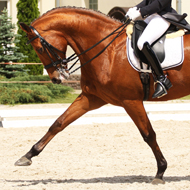
Very tight nosebands prompt stress response, study suggests
Scientists are calling for new rules on nosebands in equestrian sport after research found very tight nosebands can cause physiological stress and inhibit oral behaviours.
The research has been published in the journal PLOS ONE.
Restrictive nosebands are common in equestrian sport, which researchers say is 'concerning' as evidence suggests they may compromise welfare.
A team from the University of Sydney fitted 12 horses with a double bridle and crank noseband - which are common in dressage at elite levels.
Crank nosebands have a leveraged buckle that allows for a tighter fit than the simpler cavesson noseband, which is loosely fitted and unrestricted. Their use and extreme tightening is thought to be on the rise. Researchers say they are likely to impact welfare but this has not yet been quantified.
The horses were randomly assigned to four treatments over the course of the study, with varied levels of noseband tightness. Those with no space under the noseband had an increased heart rate, decreased heart rate variability (HRV) and increased eye temperature, which indicates a physiological stress response.
Other treatments were unfastened noseband, conventional area under noseband with two fingers of space under the noseband and half conventional area under noseband with one finger of space.
Chewing was reduced in horses with one finger of space, or no space under the noseband. Licking was eliminated in horses with no area under the noseband and yawning was negligible across all four treatments.
After removal of the noseband and bridle, yawning, swallowing and licking all increased significantly compared to the baseline, suggesting a post-inhibitory rebound response. This is thought to represent a negative welfare state as it reflects a build up of motivation.
In light of their findings, researchers are calling for new rules on nosebands. They wrote in PLOS ONE: 'Gear stewards in a competition environment should be required to check that each rider is complying with rules that prevent excessive tightening of the noseband.'
Full study can be accessed here: http://journals.plos.org/plosone/article?id=10.1371/journal.pone.0154179



 RCVS Knowledge has welcomed Professor Peter Cockcroft as editor-in-chief for Veterinary Evidence.
RCVS Knowledge has welcomed Professor Peter Cockcroft as editor-in-chief for Veterinary Evidence.